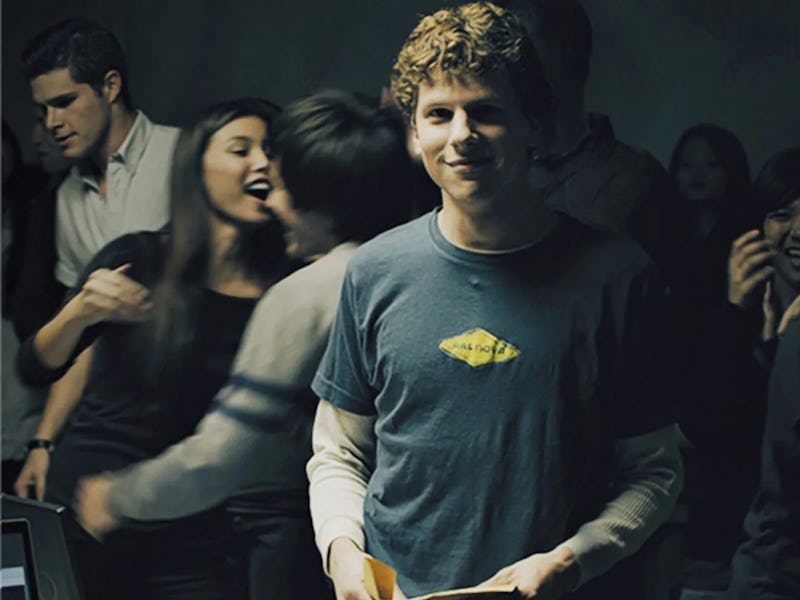The Social Network’s Nightmare Has Become Our Reality
You have a memory to look back on.

It’s almost impossible to consider what it was before it established a stranglehold on us, but there was a time when the internet seemed destined to be a beacon for technology’s positive potential. Before we truly understood the dangers posed online, there was the optimistic belief that it would connect humanity for the better, democratize knowledge and information, and confront us with perspectives that we might otherwise have never encountered.
All these years later, it’s easy to see how wrong we were. It’s as if access to the internet functions like a nebulous form of radioactivity, slowly mutating us into something less warm, less empathetic, and less authentic. Lots of films have tried to explore how our society has been changed by our compulsive addiction to the web, but few have aged as chillingly as David Fincher’s cultural lightning rod, released 15 years ago today.
As has been mentioned to the point of redundancy, The Social Network is not a very accurate depiction of the events that led to the creation and inevitable legal battle over Facebook. But Fincher’s film is an evocation of a nexus point for culture at large, a prescient observation of a massive shift in the social hierarchy of attention. Jesse Eisenberg’s smarmy, self-aggrandizing Mark Zuckerberg isn’t interested in money or even power as much as he wants eyes on him, but he’s simply not all that remarkable at Harvard. Early on, the editing juxtaposes Mark’s drunken creation of FaceMash in his dorm with a classic scene of college party debauchery to highlight how distant he is from the social circles people traditionally valued.
But we see this hierarchy change as soon as Facebook takes off. Eventually, no one cares about the social clubs or the old money kids that a college’s entire ecosystem used to revolve around; they just care about their proximity to Zuckerberg, someone they believe to be a trailblazer. It’s a shift we watched happen in the real world, where seemingly overnight, the most powerful people on Earth became a handful of CompSci graduates. People who were once shunned were now rock stars, which is why faceless accounts worship people like Elon Musk – like Mark’s relationship with Sean Parker (Justin Timberlake), it’s an idolization based on the vicarious desire to be the coolest guy in every room, if only to spite the people who once called you lame.
All the money in the world can’t provide emotional regulation.
Inevitably, it’s all motivated by the common paradox of both hating and desiring female attention. The film’s most important throughline is Mark’s desperate need for validation from his ex, Erica Albright (Rooney Mara), after their breakup inspires him to create a website that compares women based on their physical attractiveness. It’s not difficult to see how this could grow into a platform that hinges entirely upon disembodied objectification, the idea that people can be abstracted down to a name and photo and relationship status; both Mark and Eduardo Saverin (Andrew Garfield) recognize that the intention behind early Facebook is the prospect of hooking up with girls.
It’s also not difficult to see how the idea is enough to catapult Zuckerberg into the stratosphere; a resentment of women is presented as the great equalizer, the binding tie between the prestigious golden boys and the ostracized social outcasts. Both FaceMash and Facebook are built around the idea of gaining access to a woman’s humanity through a digital simulacrum, an idea that’s transcended gender to become an incredibly lucrative business model. What else is Tinder?
In retrospect, maybe we shouldn’t have given them all our personal information.
But it’s not just the rituals of courtship that have transitioned online – slowly but surely, our entire lives have. “We lived on farms and then we lived in cities, and now we’re gonna live on the internet,” exclaims an intoxicated Sean Parker, and it’s frightening how correct he was. Mark’s vitriolic blog functions as an unfiltered gateway into his psyche, the rawest distillation of his internal monologue, and isn’t that just how social media functions now? As windows into who a person is, or wants you to believe they are? Perhaps the most terrifying realization is how these digital versions of ourselves don’t even truly belong to us. As the Cambridge Analytica scandal and the activities of Palantir show us, our online essences are simply commodities to be bought and sold. “Private behavior is a relic from a time gone by.”
Beyond all else, the most important way The Social Network remains relevant is in its understanding of how our society rewards cynicism and cruelty. Even before Mark is given a legal justification to be callous and cutthroat, he exposes himself as such behind the guise of a computer screen, which is no different from the hordes of trolls and grifters ready to indulge the frustration and misery of others. While the shattering of privacy and the addiction to online validation are glaring, growing problems, perhaps the worst change has been the hardening of hearts in these anonymous online spaces. The internet has given us cause to indulge our pettiest, most self-centered instincts. Doesn’t that make us all a little like Mark?